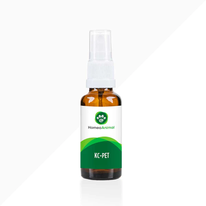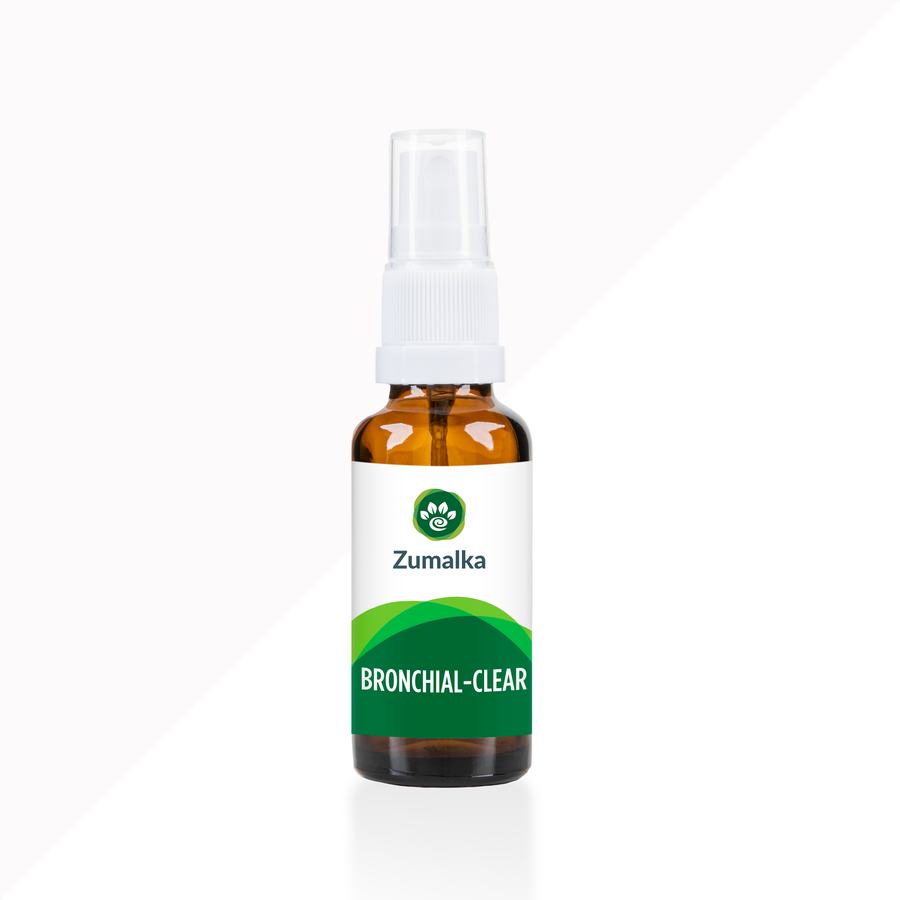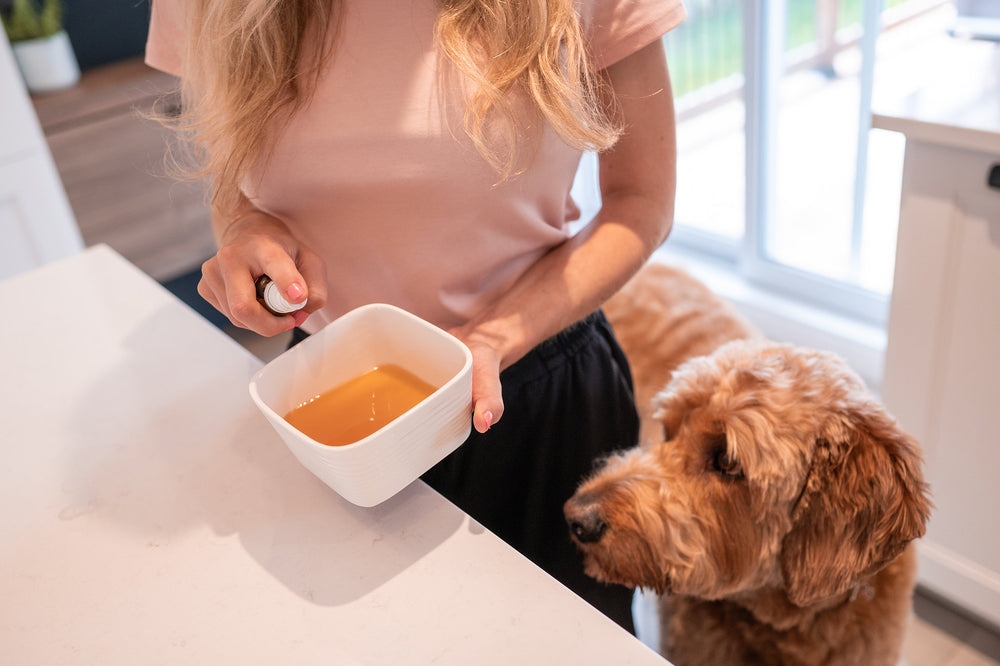Vet-Verified: 8 Causes of Dog Wheezing and the Best Natural Remedies
List of Contents
- What Exactly is Wheezing in Dogs?
- What are the 8 Top Causes of Dog Wheezing?
- When Should You Be Concerned About Dog Wheezing?
- How is Wheezing in Dogs Diagnosed?
- How Can You Help Your Dog With Wheezing at Home?
- What are the Best Natural Remedies for Dog Wheezing?
- How Do Vets Treat Wheezing in Canines?
- Can You Prevent Dog Wheezing?
- FAQs
Is your dog wheezing and you're not sure why? You're in the right place. Don’t ignore your dog’s wheezing—it could worsen over time. This article explores the top 8 causes of wheezing in dogs and provides practical solutions to help your furry friend breathe easier.
What Exactly is Wheezing in Dogs?
Wheezing is a continuous, high-pitched whistling sound heard in the lungs, usually during exhalation (breathing out). It often indicates an obstruction or narrowing of the airways. To be considered wheezing, the sound must be continuous and last longer than a quarter of a second.
Before we continue, it's important to highlight that wheezing and sneezing in dogs are two distinct conditions.
Although brief wheezing in dogs is often harmless, such as after exercise, prolonged or recurring episodes may indicate a respiratory issue that requires prompt veterinary attention.
However, for mild or occasional wheezing, natural remedies can often help manage the problem effectively.
What are the 8 Top Causes of Dog Wheezing?

So, what causes dogs to make this sound? As mentioned, canine wheezing often signals a change in airflow through the respiratory system, typically caused by a narrowing or obstruction within the airways. Below are the most common causes:
#1. Infectious disease
One of the most common effects of infectious diseases—whether caused by parasites, bacteria, or viruses—is airway inflammation. This inflammation can lead to mucus buildup, often triggering wheezing in dogs. Common culprits include heartworms, kennel cough, and canine influenza.
#2. Allergies
Canine wheezing can be triggered by exposure to allergens such as strong perfumes, scented candles, cigarette smoke, vape emissions, dust mites, mold, and pollen. This reaction is often a sign of anaphylaxis, an immune system overreaction to certain substances to protect the body.
Other signs of anaphylaxis may include sneezing, facial swelling, itching, shortness of breath, and hives.
#3. Collapsing trachea
When a dog’s trachea becomes significantly weakened, it may eventually be at risk of collapsing, often causing a distinctive “honking goose” cough.
This condition is particularly prevalent in small breeds such as Pomeranians, Chihuahuas, Toy Poodles, and Pugs due to their fragile windpipe cartilage. Tracheal collapse can also occur in older or senior dogs.
#4. Heart problem
Heart disease and related conditions can cause your dog to breathe more heavily due to fluid buildup in and around the heart. If left untreated, this can lead to wheezing, making it essential not to overlook this condition.
#5. Foreign object
Canine wheezing can also result from foreign objects lodged in the airway. The severity of the wheezing often depends on the size of the obstruction and is typically accompanied by symptoms such as excessive drooling, restlessness, and coughing.
#6. Tumors or cancer
Primary tumors or cancers in dogs, particularly those affecting the mouth, throat, and lymph nodes, can restrict breathing and potentially block the airways, leading to wheezing. This type of wheezing often worsens over time if the underlying tumor or cancer is left untreated.
#7. Chronic bronchitis
When bronchitis in dogs becomes chronic, the airways remain inflamed and more susceptible to scarring. Over time, this scarring can narrow the airways, making breathing more difficult and often leading to persistent wheezing and coughing.
#8. Chemical irritants
Common household chemicals used daily can trigger wheezing in dogs. These include room deodorizers, hairspray, cosmetics, spray paint, and shaving products, as they often contain ingredients that can irritate your pet’s airways. For clarity, any container designed to spray its contents is called an “aerosol.”
When Should You Be Concerned About Dog Wheezing?
As mentioned earlier, wheezing in dogs isn’t always a medical emergency. It may simply be a result of exercise or other high-energy activities. However, it’s essential to contact your veterinarian if you notice any of the following symptoms:
- Repeated lethargy or weakness
- A sudden decrease in appetite or unusual pickiness
- Purple or blue gums or tongue
- Wheezing accompanied by coughing, retching, or gagging
- Wheezing that lasts for several minutes
- Wheezing that persists despite rest
Seek immediate emergency care if your dog’s gums or tongue change color or if you suspect a foreign object is blocking their airway. Sudden or severe asthma attacks and serious allergic reactions also warrant urgent veterinary attention.
How is Wheezing in Dogs Diagnosed?

The first step a veterinarian takes to diagnose the cause of dog wheezing is to perform a thorough physical examination. This includes checking for fever and assessing the patient’s heart and breathing sounds.
Veterinarians often perform chest and upper airway X-rays to assess the respiratory tract. In more severe cases, a CT scan may be required for a more detailed evaluation of the lungs and trachea.
A blood test may also help identify the underlying cause of the wheezing and determine the type of infection present.
How Can You Help Your Dog With Wheezing at Home?
As mentioned earlier, natural approaches can help support respiratory health when dealing with wheezing in dogs. Here are some of the most effective natural ways to manage this condition at home:
Keep your dog’s weight ideal.
Maintaining a healthy weight for your dog helps prevent wheezing. Excess weight strains your pet’s body, particularly the lungs and airways. Obesity also increases the risk of health issues such as heart disease, respiratory problems, hypertension, and diabetes—all of which can contribute to wheezing.
A clean environment and good ventilation are essential.
Excess dust and mold can trigger wheezing in dogs by irritating their lungs. Maintaining good ventilation helps remove allergens and pathogens while providing your pet with fresh air. An air purifier can also help filter contaminants like dust mites and mildew.
Keep your dog away from strong odors and chemical irritants.
Did you know a dog’s sense of smell can be up to 10 million times more sensitive than a human’s? This is why exposing your pet to strong odors can irritate their lungs. Additionally, chemical irritants can disrupt normal airway function, leading to wheezing.
Proper diet and hydration are important.
Wheezing in dogs can sometimes result from poor nutrition and dehydration, which may compromise your pet’s lungs and airway health. To help prevent respiratory issues, it’s important to provide your dog with constant access to fresh water and to prioritize regular, well-balanced meals that meet their nutritional needs.
If your dog has allergic reactions to food, avoid common triggers such as grains, chicken, beef, and artificial additives. Incorporating novel proteins like venison and rabbit can help manage allergies. Additionally, foods rich in Omega-3 and Omega-6 fatty acids can reduce inflammation and promote clear airways.
Regular grooming is a must.
It may come as a surprise, but inadequate grooming can put your dog at risk of exposure to excessive allergens, dander, and dust. Untended fur can trap these respiratory irritants if not regularly washed, brushed, or trimmed. Chemicals and other harmful pathogens can accumulate on your pet’s coat without proper grooming.
Steam therapy can do wonders.
One of the simplest ways to help clear your dog’s airways is through steam therapy using your shower. Simply bring your pet into the bathroom, turn on the hot shower without getting directly under the water, and let the steam fill the room for at least five minutes—that’s all it takes.
Another option is to use a humidifier to increase moisture in the air. Keep in mind that for medium or large-sized dogs, the humidifier may need to run for an extended period to be effective.
What are the Best Natural Remedies for Dog Wheezing?
As previously highlighted, wheezing in dogs may indicate underlying health issues, making it crucial to identify the root cause for effective care. Possible causes include allergies, vaccine reactions, bronchitis, heart disease, asthma, flu, kennel cough, and more.
In addition to seeking expert guidance from professional pet homeopaths, the following premium natural options can help manage dog wheezing, depending on the underlying cause and any accompanying symptoms:





- Bronchial Clear Optimal: The Bronchial Clear Optimal kit is specifically designed to support dogs with bronchitis, a common cause of wheezing, by promoting clearer airways and easing respiratory discomfort naturally.
- Hericium(Lion’s Mane)/Reishi: Known for their powerful anti-inflammatory benefits, Hericium and Reishi may help soothe respiratory tract inflammation, enhance immune function, and provide relief from wheezing and other breathing difficulties.
- Cordyceps: Highly regarded for its ability to support lung regeneration and improve respiratory function, Cordyceps is particularly beneficial for wheezing associated with asthma, emphysema, and other chronic lung conditions.
- KC-Pet: Specially formulated to help alleviate symptoms of kennel cough, KC-Pet supports respiratory health and may reduce coughing, wheezing, and throat irritation in dogs.
How Do Vets Treat Wheezing in Canines?

Common conventional treatment options prescribed by veterinarians for dog wheezing include antibiotics, antihistamines, steroids, and anti-inflammatory medications. Each of these treatments targets specific underlying causes—for example, antihistamines are used to manage allergy-related wheezing, while antibiotics address bacterial infections.
However, it is common for veterinarians to recommend surgical procedures where wheezing is caused by more serious conditions, such as a collapsing or collapsed trachea, canine cancers, or foreign objects lodged in the airway. Surgery may be necessary to restore proper breathing and ensure your dog’s well-being.
Can You Prevent Dog Wheezing?
Yes, there are several effective ways to help prevent wheezing in dogs, including:
- Keep your dog’s environment clean and free from respiratory irritants such as chemicals, strong odors, and smoke.
- Maintain your dog’s healthy weight to reduce the risk of obesity-related issues like heart disease, diabetes, and high blood pressure.
- Ensure your dog has appropriately sized toys to prevent choking hazards or blockages in the throat or airway.
- Maintain a regular preventive care routine to protect your dog from parasites like heartworms and hookworms.
- Ensure your pet is vaccinated against common infectious respiratory illnesses, including influenza, Bordetella, and distemper.
- Support your dog's immune system to help prevent diseases that cause wheezing by incorporating medicinal mushrooms and/or probiotics.
FAQs
What can I give my dog for wheezing?
You can give your dog steam therapy, use a humidifier, or provide vet-recommended treatments such as antihistamines for allergies, antibiotics for infections, or anti-inflammatories. Natural remedies like Zumalka’s KC-Pet and Bronchial Clear Optimal, along with proper nutrition and hydration can help alleviate your dog's wheezing.
What can I give my dog to help her breathe better?
You can help your dog breathe better with steam therapy, a humidifier, or vet-prescribed treatments like bronchodilators, antihistamines, or anti-inflammatories. Providing proper hydration, a clean environment, and nutrition rich in Omega-3s can also improve respiratory health.
How do you get mucus out of a dog's lungs naturally?
To clear mucus from a dog's lungs naturally, use steam therapy, a humidifier, and ensure proper hydration. Natural anti-inflammatories like honey, homeopathic remedies like Bronchial Clear Optimal, and foods rich in Omega-3s can also help reduce mucus and improve breathing.
How can I treat my dog's respiratory infection at home?
To treat your dog’s respiratory infection at home, provide steam therapy, use a humidifier, ensure hydration, and offer nutritious meals. Natural remedies like honey for soothing and supplements like Omega-3s can help, but consult your vet for proper care. Consulting a Zumalka pet homeopathy expert about Breathe-EZ and Silverpet can also be beneficial.
What is the best respiratory treatment for dogs?
The best respiratory treatment for dogs depends on the cause and may include vet-prescribed bronchodilators, antihistamines, antibiotics, or corticosteroids. Supportive care like steam therapy, humidifiers, hydration, and proper nutrition can also improve respiratory health.
What home remedy can I use for my dog's breath?
For fresher dog breath, try brushing their teeth regularly with dog-safe toothpaste, adding curly parsley to their food in small amounts, offering dental chews, and ensuring proper hydration. Coconut oil or apple cider vinegar (diluted) can also help reduce bad breath naturally.
The recommended amounts of fresh chopped curly parsley are: Up to 1/2 teaspoon for small breeds, up to 1 teaspoon for medium breeds, and up to 1 tablespoon for large breeds.
Too much coconut oil can cause digestive issues, so it’s best to offer it in moderation. If your dog has gastric problems, consult a veterinarian before adding apple cider vinegar to their water, as it could further irritate their stomach.
What is the best bad breath treatment for dogs?
The best bad breath treatment for dogs includes regular brushing with dog-safe toothpaste, dental chews, professional cleanings, and a healthy diet. Adding water additives or natural remedies like curly parsley (in small amounts) and coconut oil (in small amounts) can also help maintain fresh breath.
The recommended amounts of fresh chopped curly parsley are: Up to 1/2 teaspoon for small breeds, up to 1 teaspoon for medium breeds, and up to 1 tablespoon for large breeds.
How can I stop my dog's breath from smelling?
To prevent bad breath in your dog, brush their teeth regularly, offer dental chews, ensure adequate hydration, and maintain a healthy diet. Natural remedies like coconut oil (in small amounts), curly parsley (in small amounts), and diluted apple cider vinegar can promote a fresher breath.
The recommended amounts of fresh chopped curly parsley are: Up to 1/2 teaspoon for small breeds, up to 1 teaspoon for medium breeds, and up to 1 tablespoon for large breeds.
What foods reduce mucus in dogs?
Foods that help reduce mucus in dogs include Omega-3-rich options like salmon and flaxseed, as well as anti-inflammatory foods such as turmeric, ginger, and leafy greens, which support respiratory health and reduce inflammation naturally.
Is Vicks safe for dogs to inhale?
Vicks is not safe for dogs to inhale as it contains camphor, which is toxic to dogs and can cause respiratory distress, skin irritation, or poisoning if ingested or inhaled. Always consult your veterinarian or a qualified pet homeopathy expert for safe alternatives.
What home remedy is good for dog cough?
A good home remedy for a dog’s cough includes honey to soothe the throat, steam therapy for easier breathing, and a humidifier to reduce dryness. Herbal teas like licorice root or marshmallow root can also help.
Before giving licorice root tea to your dog, ensure they are healthy and not suffering from high blood pressure, heart conditions, or kidney disease. Likewise, before offering marshmallow root tea, check that your dog is not diabetic, as it can lower blood sugar.
What can I give my dog if he sounds congested?
If your dog sounds congested, try steam therapy, use a humidifier, and ensure proper hydration. Honey can soothe airways, and natural anti-inflammatories like turmeric may help. Always consult your vet for appropriate care and treatment. A pet homeopathy expert may also suggest natural alternatives.
What is the safest essential oil to use around dogs?
The safest essential oils around dogs include lavender for calming, chamomile for relaxation, and frankincense for overall wellness. Always dilute essential oils, use them in well-ventilated spaces, and never apply them to your dog’s skin or allow ingestion.
Can I put eucalyptus oil on my dog?
No, you should not put eucalyptus oil on your dog. Eucalyptus oil is toxic to dogs and can cause drooling, vomiting, diarrhea, or breathing difficulties. Always consult your veterinarian or a pet homeopathy professional before using any essential oils on pets.
What is the best oil for dogs?
The best oils for dogs include fish oil for healthy skin, coat, and joints, coconut oil for digestion and skin health, and flaxseed oil for omega-3 benefits. Always consult your veterinarian for proper dosage and suitability for your dog. A pet homeopathy expert can also provide useful insights.
Is lemongrass oil safe for dogs to breathe?
Lemongrass oil is not entirely safe for dogs to breathe. Inhalation can cause respiratory irritation, and ingestion is toxic. Use caution, ensure proper ventilation, and consult your veterinarian or a pet wellness professional before using any essential oils around dogs.
Can I spray my dog with lemongrass?
No, you should not spray your dog with lemongrass oil. It can cause skin irritation, allergic reactions, or toxicity if ingested. Always consult your veterinarian or a professional pet homeopath before applying essential oils to your dog.
Can I use a diffuser around my dog?
You can use a diffuser around your dog with caution. Ensure proper ventilation, use pet-safe essential oils like lavender or chamomile, and avoid prolonged exposure. Always consult your veterinarian or qualified pet homeopath before using essential oils around pets.
Conclusion
While dog wheezing after high-impact activity or strenuous exercise is usually not a medical emergency, it requires proper care and attention if it occurs repeatedly or persists for an extended period.
Consulting your veterinarian is crucial when respiratory issues occur, but home remedies can help prevent such problems. Maintaining a clean environment, using high-quality natural products, ensuring regular grooming, and providing proper nutrition are all key to supporting your dog’s respiratory health.









Leave a comment